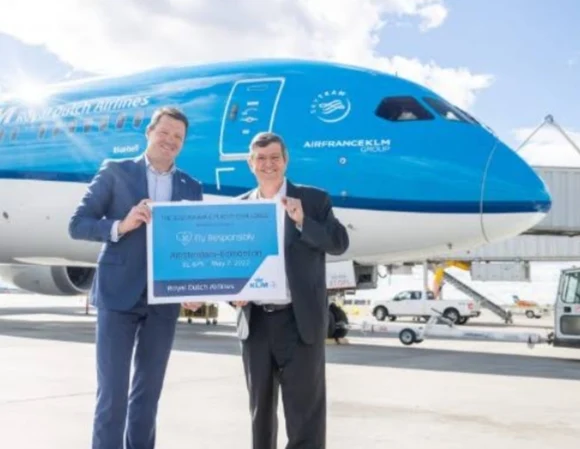KLM Takes Flight with Sustainable Aviation Fuel: Leading the Way to a Greener Sky
KLM Royal Dutch Airlines is soaring towards a more sustainable future by embracing Sustainable Aviation Fuel (SAF). As a pioneer in this area, KLM has positioned itself as a global leader in reducing the environmental impact of aviation.
This article delves into KLM's ambitious SAF initiatives and highlights the significance of this transformative fuel for the aviation industry.
Why SAF Matters:
Traditional jet fuel, made from fossil fuels, is a major contributor to greenhouse gas emissions in the aviation sector. SAF, on the other hand, offers a greener alternative. Produced from renewable sources like used cooking oil, agricultural waste, and even recycled carbon dioxide, SAF significantly reduces lifecycle carbon emissions compared to conventional fuel.
KLM's Pioneering Efforts:
KLM's commitment to SAF goes beyond mere words. The airline boasts several impressive achievements:
- World's Largest SAF User: In 2022, KLM consumed a staggering 17% of the world's total SAF production, demonstrating its dedication to scaling up the use of this sustainable fuel.
- 1% SAF Blend Standard: Since 2016, KLM has blended 1% SAF in every flight departing from Amsterdam Schiphol Airport, showcasing its proactive approach to reducing emissions.
- Stringent Sourcing Policy: KLM ensures its SAF is sourced responsibly, adhering to strict criteria that minimize harm to biodiversity and food production.
Looking Ahead:
KLM's vision extends far beyond the present. The airline has ambitious plans to increase its SAF usage significantly in the coming years. Key strategies include:
- Partnering with SAF producers: KLM actively collaborates with fuel companies to secure long-term SAF supply and boost production capacity.
- Investing in infrastructure: The airline is committed to developing infrastructure at Schiphol to accommodate larger volumes of SAF handling and storage.
- Advocating for policy changes: KLM actively collaborates with governments and industry organizations to push for supportive policies that accelerate SAF adoption throughout the aviation sector.
KLM's Soaring Commitment to Sustainable Aviation Fuel: Statistics that Impress
KLM Royal Dutch Airlines is a true champion of sustainability in the aviation industry, spearheading the use of Sustainable Aviation Fuel (SAF) to reduce its environmental impact.
Here's a look at some impressive statistics that showcase KLM's dedication to a greener sky:
Global Leadership:
- World's Largest SAF User in 2022: KLM consumed a staggering 17% of the world's total SAF production, a testament to its unwavering commitment to this sustainable fuel.
- 1% SAF Blend Standard Since 2016: Every flight departing from Amsterdam Schiphol Airport boasts a 1% SAF blend, demonstrating KLM's proactive approach to reducing emissions.
Rapid Growth:
- Doubling SAF Use in 2023: Compared to 2022, KLM nearly doubled its SAF consumption in 2023, reaching an impressive 80,000 metric tons. This represents a 1% incorporation rate, showcasing significant progress.
Ambitious Goals:
- 10% SAF Target by 2030: KLM is aiming for a tenfold increase in SAF usage by 2030, aiming for 10% of its total fuel consumption to be SAF-based. This ambitious goal sets a high bar for the industry.
- Investing in Infrastructure: To support its growing SAF needs, KLM is actively developing infrastructure at Schiphol Airport to handle and store larger volumes of this sustainable fuel.
Beyond KLM:
- Industry-wide Impact: KLM's leadership in SAF inspires and encourages other airlines, fuel producers, and stakeholders to embrace this sustainable alternative. This collective effort can significantly reduce the aviation industry's environmental footprint.
A Brighter Future:
KLM's impressive statistics paint a picture of a future where sustainable aviation takes flight. By prioritizing SAF use and collaborating with other industry players, KLM is paving the way for a cleaner and greener sky for generations to come.
These statistics are just a snapshot of KLM's commitment to SAF. You can delve deeper by exploring specific initiatives, partnerships, and challenges related to scaling up SAF usage. Remember, the fight against climate change is a collective effort, and KLM's leadership serves as a beacon of hope for a more sustainable future of air travel.
Table summarizing KLM's impressive SAF statistics:
Here's a table summarizing KLM's impressive SAF statistics:
| Category | Statistic |
|---|---|
| Global Leadership | |
| World's Largest SAF User in 2022 | 17% of global SAF production |
| 1% SAF Blend Standard Since 2016 | All flights from Amsterdam Schiphol Airport |
| Rapid Growth | |
| SAF Consumption in 2023 | 80,000 metric tons |
| Incorporation Rate in 2023 | 1% |
| Ambitious Goals | |
| 10% SAF Target by 2030 | 10% of total fuel consumption to be SAF-based |
| Infrastructure Investment | Developing SAF handling and storage at Schiphol Airport |
Beyond KLM:
KLM's leadership in SAF has a ripple effect across the aviation industry. By demonstrating the feasibility and benefits of SAF, KLM encourages other airlines, fuel producers, and stakeholders to follow suit. This collective effort could pave the way for a significant reduction in aviation's environmental footprint and contribute to a more sustainable future for air travel.
Conclusion:
KLM's pioneering use of SAF is a beacon of hope in the fight against climate change.
By actively promoting and scaling up the use of this sustainable fuel, the airline is not only reducing its own carbon footprint but also paving the way for a greener future for the entire aviation industry. With KLM at the forefront, we can be confident that the skies of tomorrow will be not only filled with airplanes but also with hope for a more sustainable world.




